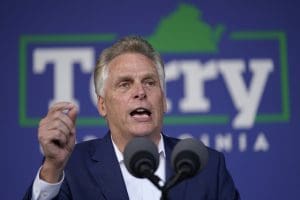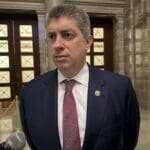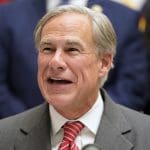Texas' extreme abortion ban raises stakes in Virginia governor's race
Reproductive rights have been thrust into the spotlight as Election Day in Virginia approaches.

Texas’ ban on almost all abortions in the state has brought the issue of reproductive rights to the forefront in Virginia’s upcoming gubernatorial election, with Democrats saying that the law raises the stakes for the outcome of the race.
Already, Democratic gubernatorial nominee Terry McAuliffe was making attacks on abortion an issue in the contest — touting his support for reproductive rights and identifying his opponent, GOP nominee Glenn Youngkin, as an extremist.
Now, Texas — which enacted a law on Sept. 1 that banned abortion procedures at six weeks’ gestation, before many people know they’re pregnant, and with no exceptions for rape or incest — has given McAuliffe’s message a boost, with Democrats arguing that abortion rights are now on the ballot in the state.
“After the U.S. Supreme Court ruled to support Texas’ draconian abortion restrictions, the urgency of protecting reproductive rights at the state level skyrocketed,” the Virginia Democratic Party said in a Wednesday statement.
Texas’ law would likely ban more than 85% of abortions in the state, according to reproductive rights groups, since the vast majority take place after six weeks’ gestation. But Youngkin has refused to condemn Texas’ law, which also, notably, creates a vigilante justice system that encourages average citizens to file lawsuits against anyone believed to have aided someone seeking an abortion, rewarding those citizens with $10,000 if they are successful.
Rather than offer criticism of the law, Youngkin has responded by telling a local ABC affiliate that he’s “pro-life” but believes in abortion exceptions “for rape, incest and when the life of a mother is in jeopardy.”
But Youngkin told supporters at an event in July that he can’t divulge his true beliefs on abortion rights because it would hurt his gubernatorial bid in Virginia, a state that has grown more and more Democratic over the years. Instead, he said he first needs to win the governor’s mansion before he can go on “offense” against abortion.
“When I’m governor, and I have a majority in the House, we can start going on offense,” Youngkin was caught on video telling supporters. “But as a campaign topic, sadly, that in fact won’t win my independent votes that I have to get. So you’ll never hear me support Planned Parenthood, what you’ll hear me talk about is actually taking back the radical abortion policies that Virginians don’t want.”
McAuliffe already ran an ad highlighting Youngkin’s comments about abortion.
And since the Texas law went into effect, McAuliffe has been holding Youngkin to task on abortion rights again, saying that if the Republican candidate wins, a Texas-style anti-abortion law could come to Virginia.
“I’m up against a guy who says he’ll go on ‘offense’ to ban abortion,” McAuliffe tweeted on Wednesday. “We can’t let Glenn Youngkin bring the Texas abortion ban here to Virginia.”
Other Democrats in Virginia are echoing McAuliffe’s comments.
“Texas’s abortion ban is a reminder of just how much state elections matter,” Democratic state Sen. Jennifer McClellan tweeted. “Virginia’s progress protecting and expanding access to abortion is at stake this November. We must elect @TerryMcAuliffe, Lt. Gov. nominee @HalaAyala, Attorney General nominee @MarkHerringVA, & protect our pro-choice majority in the VA House!”
Youngkin’s campaign strategy has included misrepresenting some of McAuliffe’s positions on abortion rights.
When asked about the Texas law on Sept. 1, Youngkin sidestepped the question and instead falsely said McAuliffe “promotes abortion all the way up through and including birth.”
McAuliffe, for his part, says he supports current Virginia law, which allows abortion through the end of the second trimester of pregnancy or if a patient’s life or health is endangered.
Ultimately, political handicappers say the Texas ban could be a boost for Democrats, activating their base and getting them to turn out in an off-year election where they may have otherwise stayed home.
“The Texas law makes the hypothetical issue of abortion and the Supreme Court tangible, relevant and urgent to base Democrats,” nonpartisan political handicapper Nathan Gonzales wrote in a column in Roll Call.
Early voting in Virginia begins on Sept. 17, with Election Day on Nov. 2.
Polling has shown McAuliffe with a consistent lead over Youngkin. Currently, McAuliffe leads Youngkin by 5.2 points, according to the RealClearPolitics average.
The nonpartisan handicapping outlet Inside Elections rates the race a “likely Democratic” contest.
Published with permission of The American Independent Foundation.
Recommended

SC governor to sign bill banning hormone therapy for transgender youth into law
Treatments for youth already taking the drugs could be gradually taken off them through Jan. 31
By Skylar Laird, South Carolina Daily Gazette - May 09, 2024
Ohio Gov. DeWine said he didn’t know of millions in FirstEnergy support. Is it plausible?
Ohio Gov. Mike DeWine’s claim to not know about the millions an Akron utility spent supporting his 2018 campaign for governor simply isn’t credible, an Ohio political scientist said in a recent interview. A spokesperson for DeWine pushed back. FirstEnergy provided that support, then spent more than $60 million to pass and protect a $1.3 billion ratepayer-financed […]
By Marty Schladen, Ohio Capital Journal - April 29, 2024
Missouri governor hopeful Bill Eigel rejects affordable childcare proposal
Eigel has previously supported stripping funds from public schools and once opposed an expansion of early kindergarten.
By Jesse Valentine - April 15, 2024










































































